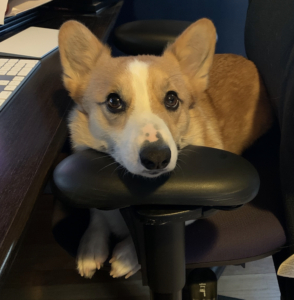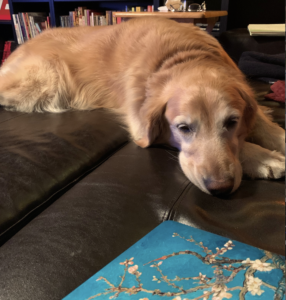Proof of Concept
![]() Once again the plot rainbow proves its worth. Last weekend we pushed ourselves to finish filling in the rainbow for Book 1 of our in-progress Ghost Series. It deviates from the rainbows we’ve created for previous novels in that it’s wider and shorter, but it still covers the floor pretty effectively (and flummoxes the dogs). We’re not completely done with it yet, just done enough. The broad strokes are all there, and some of the nuance. We’ve considered most of the beats from multiple angles and filled in the big holes. Now we’ll move on and do the same thing for the other three planned books in the series, getting them all to the same level of ripeness.
Once again the plot rainbow proves its worth. Last weekend we pushed ourselves to finish filling in the rainbow for Book 1 of our in-progress Ghost Series. It deviates from the rainbows we’ve created for previous novels in that it’s wider and shorter, but it still covers the floor pretty effectively (and flummoxes the dogs). We’re not completely done with it yet, just done enough. The broad strokes are all there, and some of the nuance. We’ve considered most of the beats from multiple angles and filled in the big holes. Now we’ll move on and do the same thing for the other three planned books in the series, getting them all to the same level of ripeness.
At least that was the plan.
We were really pleased with how thorough we were. “Wow,” we thought. “That’s one nicely detailed plot outline!” And then we gave each other high-fives and drank some champagne, etc etc. And then we spent half-an-hour numbering all the cards and stacking the whole thing neatly so that the dogs could walk around the room again. It was all terribly satisfying.
And then, Boom. On literally the first day of work on Book 2 we discovered something lurking in the notes that needs to be introduced in Book 1.
Sigh.
Luckily it’s not something that will require us to rethink half of the plot, or anything dire like that. It’s a detail that needs to be included, and we need to give serious consideration to how certain characters will feel about it.
Discoveries like this are why we’re working the whole series at the same time. We’d really hate to have the first novel entirely written and then discover we’d left something out. It’s also why we are so enamored of our plot rainbow process. It’s much easier to shift a few pieces of colored paper around on the floor (while fending off a corgi) than it is to rewrite a chapter or two.
A good writing partner is someone who will sacrifice herself to keep the dogs happily snuggling on the sofa while you crawl around on the hardwood, narrowly avoiding paper cuts.


